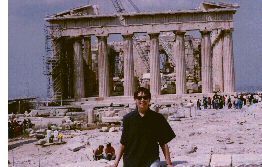
|
Icarians: The Joy of Giving Back By Aurelia “They were ordinary people who did extraordinary things.” Joanne Melacrinos Archivist Pan-Icarian Brotherhood of America
This strong “back and forth” movement between America and Icaria which distinguished the early immigrants continues to this day. Descendants of these pioneers have raised millions in America to improve their homeland and have built a high school, hospitals, and a home for the elderly. Each year thirty-six scholarships are awarded to children, many of whom are in college. Today the Icarians can lay claim to the oldest Hellenic organization in the Western Hemisphere and this past Labor Day the Pan-Icarian Brotherhood celebrated its 100th anniversary with a convention in Pittsburgh, PA., attended by about 3,000 people from all over the United States. George Vassilaros, Jr., President of the Pittsburgh Chapter, Icaros, said it is one of twenty-five with twenty-three in the States and two in Canada. There are also Icarian units in Athens and Australia. Most of the Icarian men who immigrated to American came between 1900 and 1915 and then again from 1945 to 1960. It is believed some may have come before 1890. They settled first in Pittsburgh, Detroit and Chicago and instead of looking at the vast vista of the Aegean and breathing its clean air, these former seamen were now witnessing the building of the tall structures that began to change America’s flat, agricultural landscape as their nostrils filled with the smoke that billowed from huge stacks on industrial plants and steel mills. Undaunted, the men soon realized t
Finding work which suited their skills was their first step toward liberty and independence. After all, they were uneducated because of the dominance of the Turks, and they could not as yet speak English. But their spirits were indomitable and they came from the island of Icaria. Perhaps their origins on the island of Icaria explain why these rather ordinary men would do extraordinary things. In the myth of Icarus, the young boy and his father, the architect Daedalus were imprisoned in a labyrinth by King Minos because the King suspected Daedalus had helped Athenian youth who were going to be sacrificed escape from the half-man, half bull Minotaur in Crete. Daedalus, the great inventor, told his son, Icarus, that they may not be able to escape by water and land, “but the air and the sky are free.” Daedalus then made two pair of wings for them and he warned his son not to fly too close to the sun as the sun would melt the wings. Icarus, however, was so exhilarated by his freedom that he did not heed his father’s warning and he soared higher and higher until his wings melted. While Icarians identify with Icarus’ sense of liberty, freedom, and exuberance, they know better than to fly too close to the sun and are cautious and careful planners. It is because of these traits that they quickly realized the need to form a mutual aid society in their new homeland. The purpose of this society was to help their own. They helped other Icarians find jobs, pay hospital bills, save for funeral expenses, and acquire social standing. This society grew to the Pan-Icarian Brotherhood. George Vassilaros, Sr., says this is “the oldest Hellenic organization of its kind in the Western Hemisphere.” As members of the Brotherhood became prosperous they reached out to other Icarians in America and eventually the organization was strong enough to begin helping the island of Icaria itself, where approximately 10,000 people live today. The first project was undertaken in 1925 when funds were raised to build a high school on the island. After World War II, money was raised to build roads and make repairs. The Pan-Icarian Foundation was established in 1961 and $100,000 was raised from 900 individuals to build a hospital. Today, three hospitals and one home for the elderly have been built with funds gathered in the United States. The odyssey of the Icarians, who this year celebrate their 100th anniversary in the United States, is remarkable indeed. How does one sum up their extraordinary accomplishments? Mrs. Melacrinos, the archivist, referred me to a quotation by an unknown author. The quotation reads: “Heroes are the people who do what has to be done when it needs to be done regardless of the consequences.” The Icarians who came here were lived as poor and uneducated islanders under Turkish rule. Like other immigrants, they became America’s cheap labor, lived lonely lives on the fringes of American society, and endured the humiliation of signs for jobs that warned, “Blacks and Greeks need not apply.” But they did what had to be done and they did it well. They built their own secure, mutually beneficial social structure and helped each other survive. But then they took that leap toward the sun that made them heroes in the eyes of their home country—they gave back ten fold to the island of Icaria and in the process they have kept the flame and spirit of Icarus ignited. Ordinary men, indeed. TELOS Aurelia is the author of A Lone Red Apple, a love story set on the island of Mykonos. Visit her website at http://www.aloneredapple.com. Her e-mail address is “Aurelia@aloneredapple.com.” |
|

